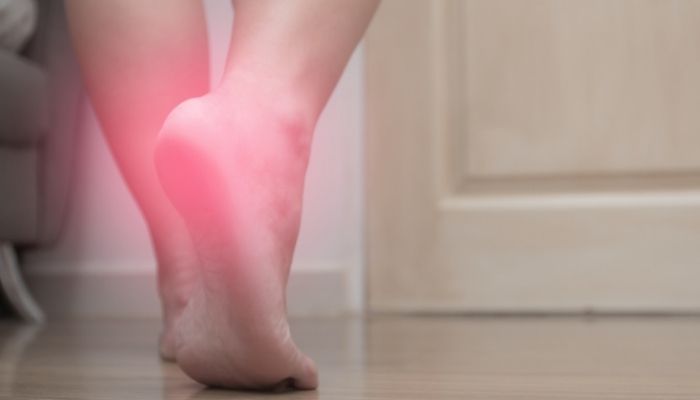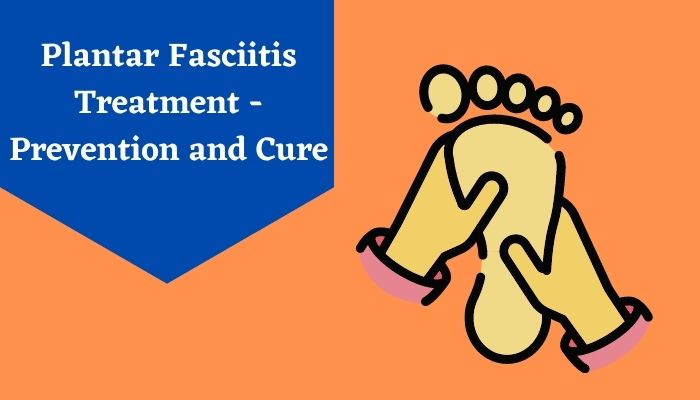Shamita is a mother of a 9 years old daughter, who has put on weight over the last few months due to weddings in the family. She made a New Year's resolution to lose weight by dieting and exercising. She tried jogging in the morning and after just two to three days felt acute pain in her left foot. When the pain increased and she felt uncomfortable standing and doing her household chores, she consulted a doctor. The doctor told her that she is suffering from plantar fascia pain. As part of the treatment for plantar fasciitis, the doctor advised her some stretching exercises and to wear a heel cup in her footwear for relief along with some medicines to get instant relief.

Heel pain is a common issue in people who tend to stand for long hours like teachers, waiters, and athletes. These days, even housewives are suffering from this problem called plantar fasciitis. 1 out of 10 people around you are suffering from this foot problem called plantar fasciitis and it generally affects people who are obese.
Let’s acquaint you with what is plantar fascia pain and then throw light on some of the best plantar fasciitis pain relief ideas.
What is Plantar Fascia Pain?
Plantar Fasciitis
is the pain experienced in the bottom of your heel. It is a weblike thick ligament connecting your heel with the front of your foot. The main role of the plantar fascia is that it supports your foot arch by acting as a shock absorber, thereby it helps in proper walking. These days, a majority of orthopedic patients complain about plantar fascia pain due to the wear and tear of this ligament.
Symptoms of Plantar Fasciitis
The most common symptom of plantar fasciitis is pain right at the bottom of the heel and sometimes in the bottom of the middle foot area. Initially, it starts by affecting just one foot, but gradually if left untreated, it may affect both due to pressure on the other foot while walking. Talking about the plantar fascia pain,
it may increase slowly and gradually.
The pain in some cases may go away on its own or go sharp and a person might feel a burning and intolerable sensation the moment the foot is placed on the ground to walk. People suffering from plantar fasciitis may feel it extremely difficult to climb stairs and walk for long. Standing for long also increases the inflammation and pain associated with plantar fasciitis.
Causes of Plantar Fasciitis
To cure any problem, it is important to first identify the root cause. To get effective treatment for plantar fasciitis, make sure to first understand the causes of plantar fasciitis. This pain in the heel can be caused due to several reasons like:
- Foot Structure
- Wrong Shoes
- Wrong Style of Walking
- Walking on Wrong Types of Surfaces
- Being Overweight
- Prolonged Standing, Running, or Jumping
- Medical Conditions like Rheumatoid Arthritis or Lupus
Treatment for Plantar Fasciitis
Depending on the severity level of your plantar fasciitis, you can decide on effective treatment to get some relief. Severe symptoms need more effective treatments, whereas, those experiencing mild symptoms, may get relief with minor treatments too. Some of the treatments for plantar fasciitis are:
1. Applying Ice Packs
Instant plantar fasciitis pain relief
can be sought by applying ice packs on the affected foot. These days, doctors are recommending ice packs to get rid of inflammation at different body parts. This is a completely safe method and effective too to experience some relief from the pain.
2. Physiotherapy and Stretching
Second common treatment for plantar fasciitis is physiotherapy. A trained physiotherapist will help you treat the issue with certain stretching exercises. You can indulge in some stretching exercises to strengthen your leg and foot muscles. Make sure to do them in the right way else they can do further damage.
3. Modification in Activity Level
Likewise, you can seek plantar fasciitis pain relief
by modifying the activity level in your day-to-day life. Try changing the types of shoes you wear and apply athletic tape to support the ligaments and muscles of your foot. Try placing heel cups and decrease your overall walking duration. Indulge in some running rather than jumping, and swimming rather than cycling to avoid more stress on the affected foot.
4. Medication
In some cases, the doctor may prescribe you medications to control your inflammation in the foot. Usually, the medicines prescribed for plantar fasciitis are anti-inflammatory medicines like Ibuprofen, Naproxen Sodium, Acetaminophen, and so on.
5. Shock Wave Therapy
Up next, there is also an option of shock wave therapy to get relief from severe plantar fascia pain. In this technique, high or low energy shock waves are given to the affected area to heal that part.
6. Steroid Injections
If you are still unable to experience relief from plantar fasciitis pain, your doctor may prescribe you steroid injections. Depending on the severity of your condition, your doctor may prescribe one or two steroid injections to reduce inflammation in the affected area.
7. Gastrocnemius Recession
Last option to look up at if none of the above-mentioned treatments for plantar fasciitis
work is surgery. The surgeon will conduct a gastrocnemius recession surgery to lengthen the gastroc tendon, which will give relief by enabling more mobility of your feet by tightening the calf muscles. This treatment, however, is the last option when nothing else seems to give relief to the patient.
The Bottom Line
Don’t take pain in the heel lightly, as it is most likely to be plantar fasciitis. Start by first exercising to stretch your calf muscles, and once in a while, try taking OTC medicines or painkillers. But, if the pain doesn’t subside, do consult your doctor, who will suggest you the right treatment for plantar fasciitis.
At the same time, do educate yourself with home remedies and exercises for an instant cure from this foot problem.


